Australia’s National Statement to the 25th OSCE Ministerial Council
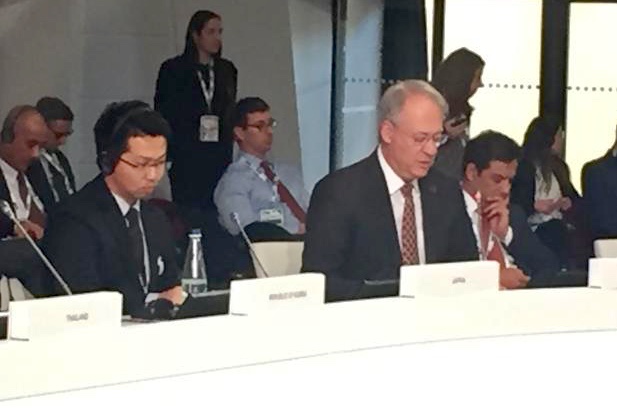
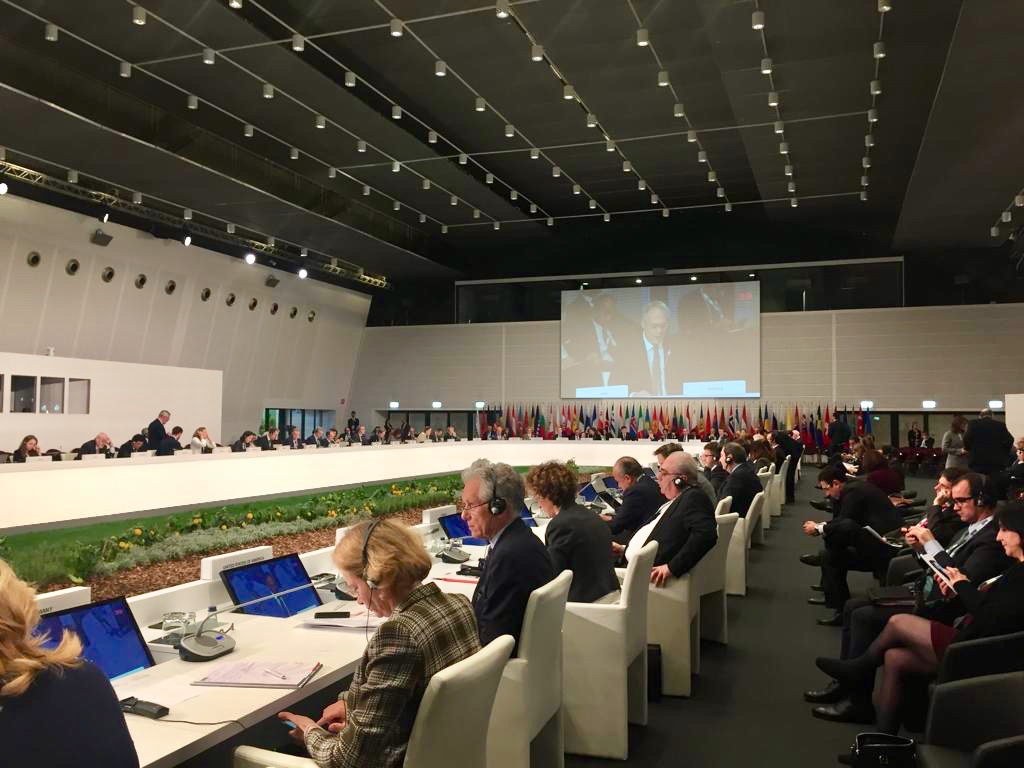
Photo caption: Ambassador Dr Brendon Hammer delivering Australia’s national statement at the 25th meeting of the OSCE Ministerial Council in Milan. Copyright: Australian Embassy.
Ambassador Dr Brendon Hammer delivered Australia's statement to the 25th Ministerial Council of the Organization for Security and Co-operation in Europe (OSCE) in Milan, Italy, on 7 December 2018. Australia has been an Asian Partner for Co-operation of the OSCE since 2009. The Asian Partners process is a valuable means for Australia to engage with and share experiences and best practice with the OSCE on addressing key security challenges for the Indo-Pacific and for the OSCE region.
As a strong proponent of the rules based international order, Australia will continue to engage in the OSCE Asian Partners process with a view to enhancing dialogue, safeguarding common values, and to bring Indo-Pacific perspectives to the OSCE table.
Read Australia’s full Ministerial Council statement here.
Australia at the 2018 IAEA Ministerial Conference on Nuclear Science and Technology
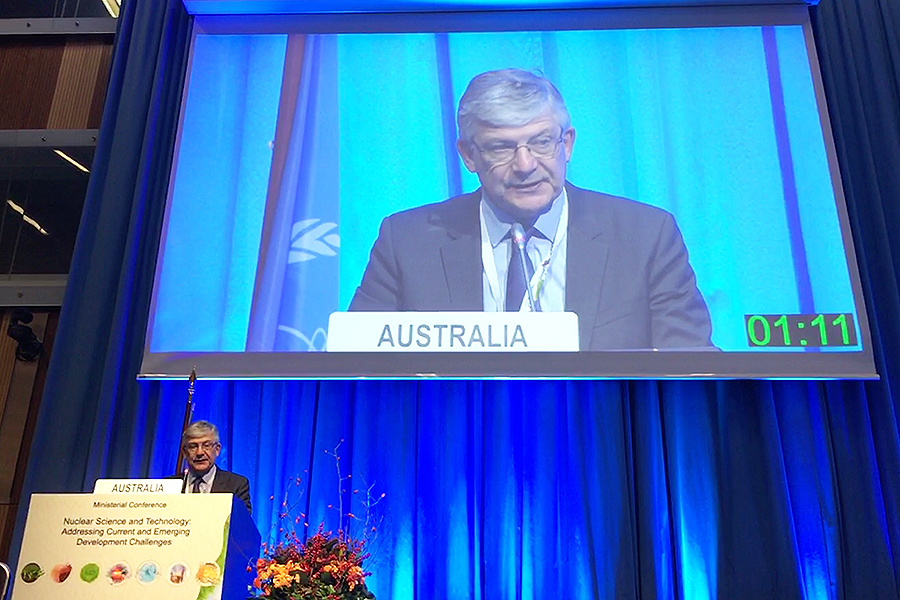
Photo caption: Dr Adi Paterson, CEO of ANSTO, delivered Australia’s national statement to the first IAEA Ministerial Conference on Nuclear Science and Technology. Credit: Australian Embassy
The first IAEA Ministerial Conference on Nuclear Science and Technology was held in Vienna from 28-30 November, providing a platform for high-level discussions on the importance and positive impact of the peaceful uses of nuclear science and technology. The Australian delegation, headed by Dr Adi Paterson, CEO of the Australian Nuclear Science and Technology Organisation (ANSTO), highlighted Australia’s role in promoting the peaceful uses of nuclear science and technology throughout our region – including through the leadership of IAEA projects that are enhancing medical physics services, improving soil and water quality, minimising agricultural land degradation, increasing crop yields, and assessing coastal vulnerability to sea-level rise. Australia also used the occasion to call for greater effort on increasing the participation of women at the IAEA and in science and engineering more broadly.
Read Australia’s national statement, as delivered by Dr Paterson, here.
Dr Paterson also participated in a panel on ‘Women in Nuclear’, a TEDx talk on nuclear technologies improving outcomes for cancer sufferers, and a side event hosted together with Belgium and the Netherlands on the production of Mo-99 – necessary for the vast majority of nuclear medicine procedures.
Australia’s Participation at the 9th Session of the Conference of the Parties to the UN Convention against Transnational Organized Crime
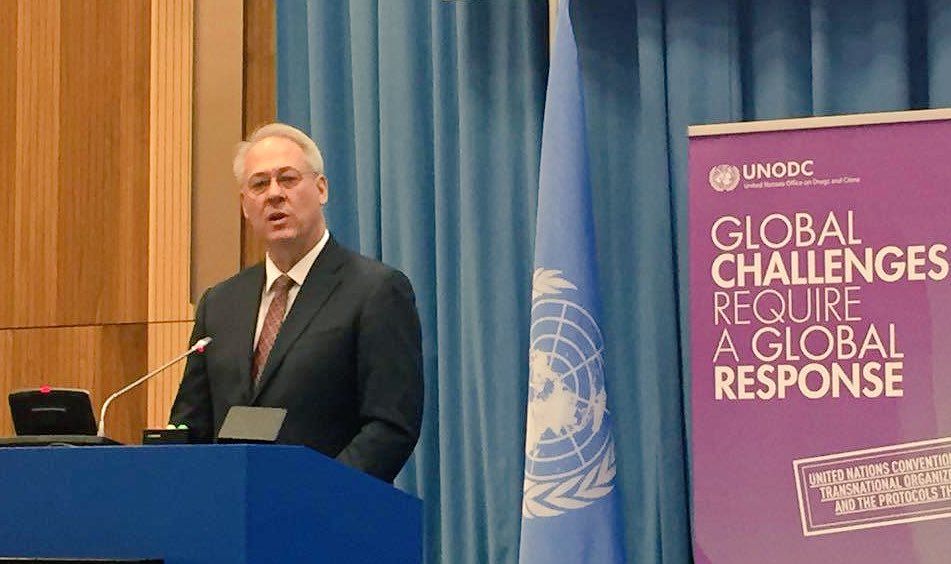
Photo caption: Ambassador HE Dr Brendon Hammer, Permanent Representative to the United Nations in Vienna, delivering Australia’s national statement to the 9th session of the Conference of the Parties to the UN Convention against Transnational Organized Crime. Copyright: Australian Embassy.
Photo caption: Mr Cameron Archer, People Smuggling and Human Trafficking Taskforce (DFAT), speaking at a side event “Tackling emerging trends in Modern Slavery and Human Trafficking.” Copyright: Australian Embassy.
Australia participated at the 9th session of the Conference of the Parties to the UN Convention against Transnational Organized Crime (UNTOC COP), in Vienna from 15-19 October. The UNTOC and its Protocols on human trafficking, migrant smuggling and firearms trafficking provide a vital platform for international cooperation. Australia’s engagement in the UNTOC COP focuses on promoting strong international standards, identifying areas for cooperation and the technical assistance needs of other states in order to strengthen international responses to transnational organized crime. A copy of Australia’s national statement can be found here.
A key achievement of the Conference was its successful adoption of a mechanism to review the implementation of UNTOC. A landmark moment for international crime cooperation, the mechanism will enable states to share good practices and challenges, improve capacity to prevent and combat transnational organized crime, as well as identify specific needs for technical assistance.
Australia also highlighted our own efforts to tackle modern slavery and human trafficking at domestic, regional and global levels. Our efforts to enhance supply chain transparency, including: through the introduction of the Modern Slavery Act; our role, as co-chair of the Bali Process; and our function as chair of the Alliance 8.7 global partnership on eradicating modern slavery and human trafficking were key points of advocacy. We also highlighted Australia’s role on tackling illicit financial flows through the Bali Process policy guide on following the money in trafficking in persons cases and our support for Liechtenstein in convening the Financial Sector Commission on Modern Slavery and Human Trafficking.
Exile in Australia
'He embraced Australia as his home as he felt Australia embraced him' *
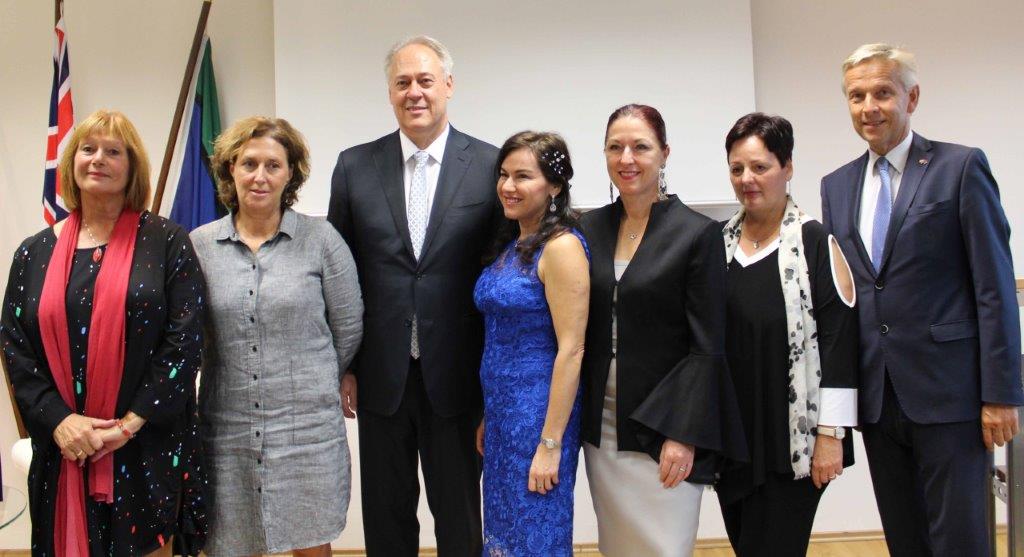
Photo caption (l-r): Susanne Altschul, descendant of victim of National Socialism; Amber Kehm, descendant; Ambassador Dr Brendon Hammer; Tania de Jong AM, descendant; Hannah Lessing, Secretary General, National Fund; Dr Renate Meissner MSc, Scientific Head, National Fund; Dr Reinhold Lopatka MP, President, Austrian-Australian Society. Copyright: Australian Embassy.
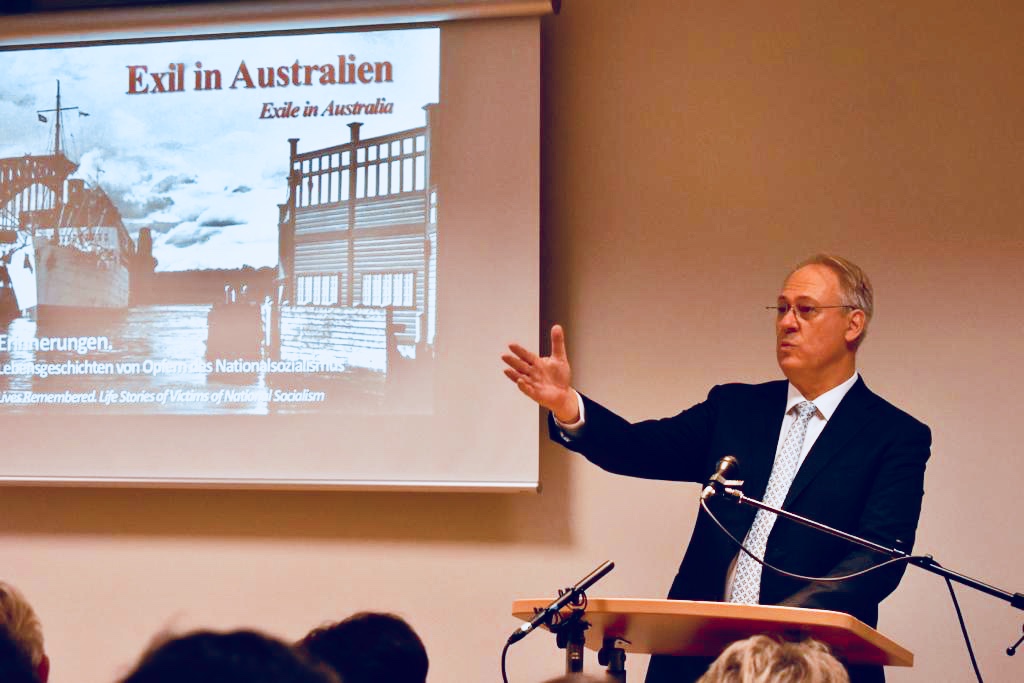
Photo caption: Ambassador Dr Brendon Hammer delivering his welcome. Copyright: National Fund. Copyright: Australian Embassy.
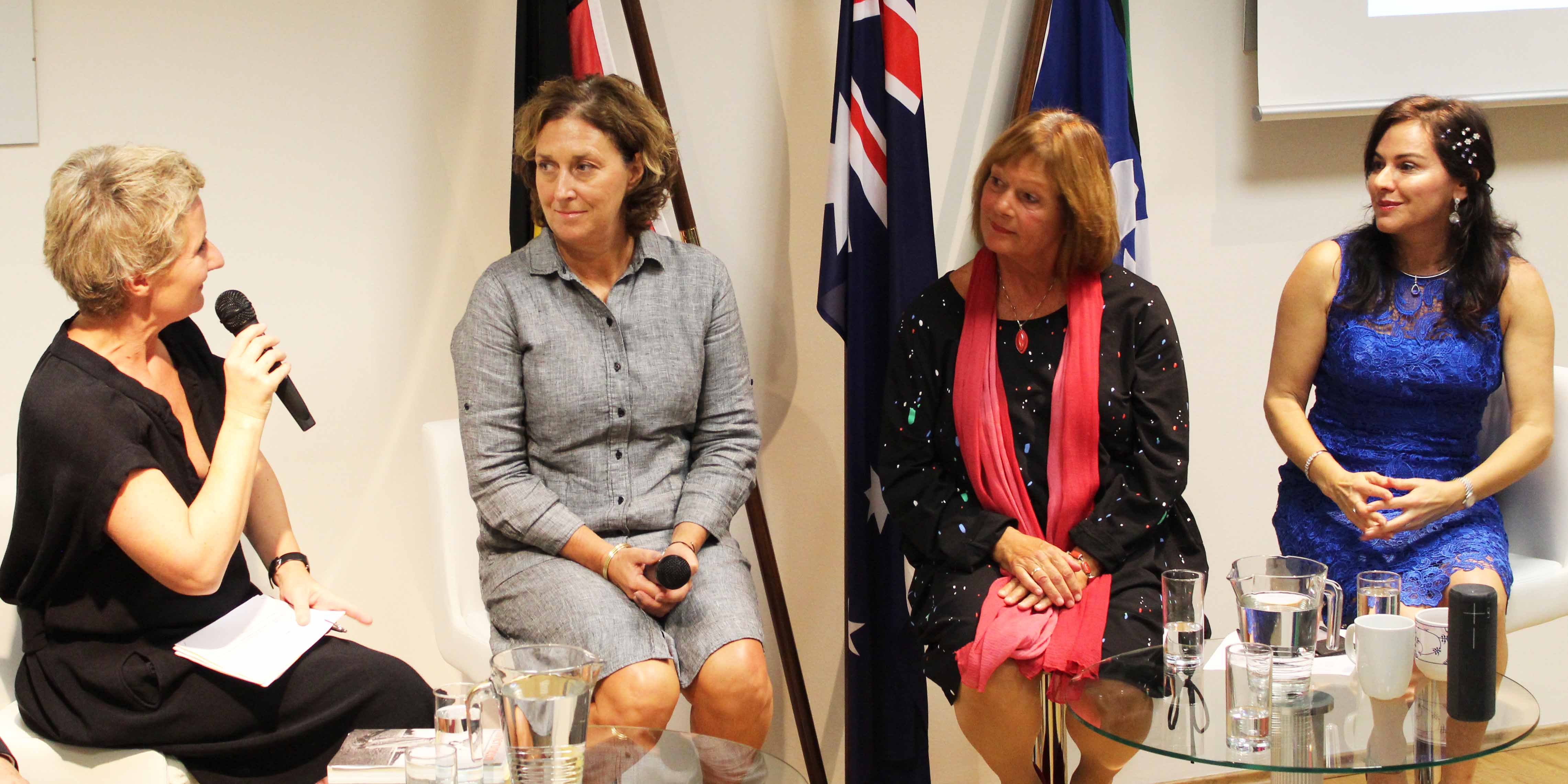
Photo caption (l-r): Dr Barbara Tóth, journalist, interviewing Amber Kehm, Susanne Altschul and Tania de Jong AM, descendants of victims who fled Austria from National Socialism and found refuge in Australia. Copyright: Australian Embassy.
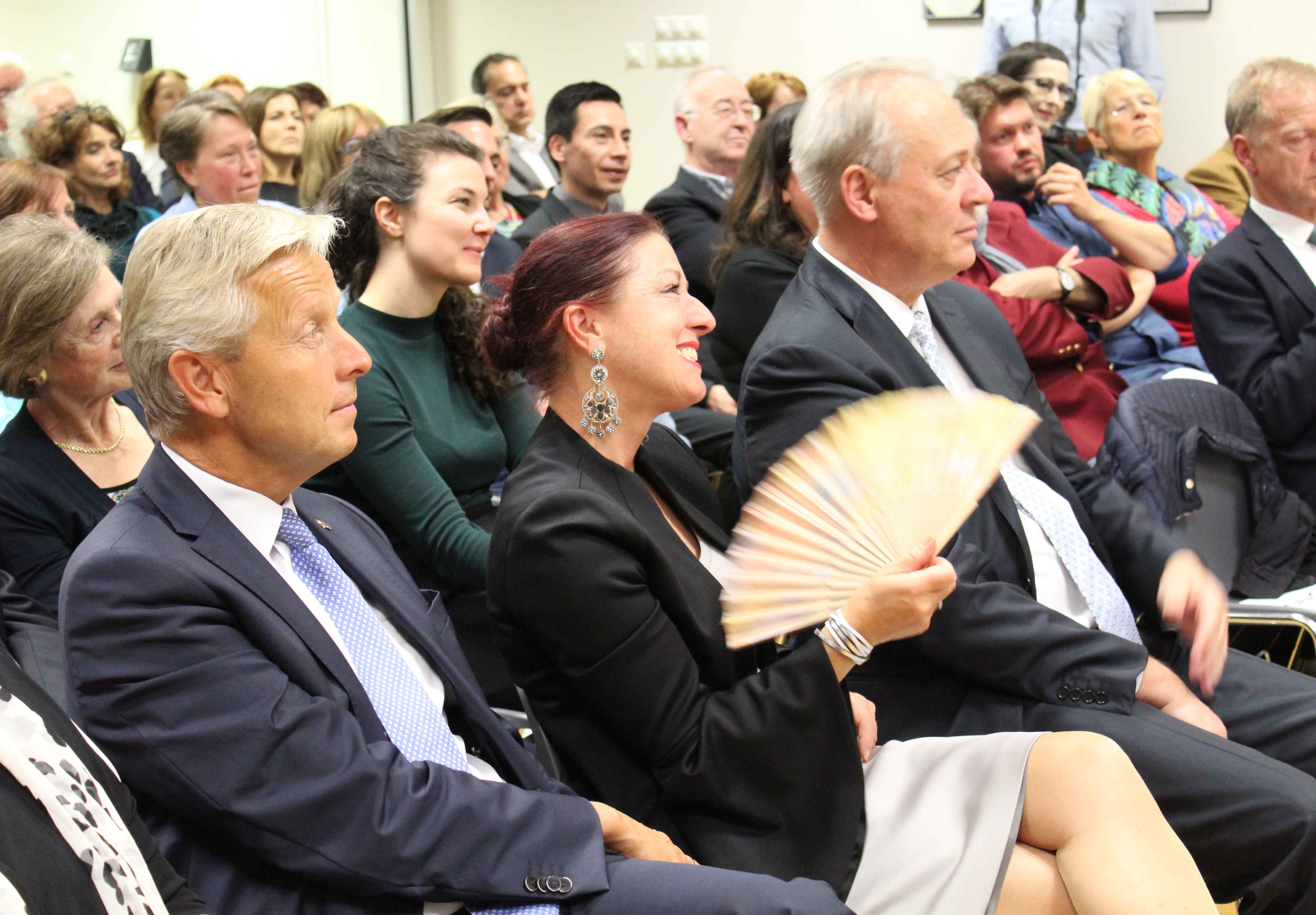
Photo caption (l-r): Dr Reinhold Lopatka MP, President, Austrian-Australian Society; Hannah Lessing, Secretary General, National Fund; Ambassador Dr Brendon Hammer; and guests. Copyright: Australian Embassy.
On 2 October 2018, Ambassador Dr Brendon Hammer and Ms Hannah Lessing, Secretary General of the National Fund of the Republic of Austria for Victims of National Socialism, co-hosted the launch of the book Exile in Australia. Lives Remembered. Life Stories of Victims of National Socialism at the Australian Embassy. The three-volume publication features personal accounts, both written and photographic, of people who fled Austria under the National Socialist regime and found a new home in Australia.
At the launch, descendants of victims shared moving family stories. Over 140 guests, including young Austrians who have served or will be serving as Austrian servants abroad at the Jewish Holocaust Centre in Melbourne attended. Dr Renate Meissner, Deputy Secretary General and Scientific Head, National Fund, introduced the book, which will be distributed to schools throughout Austria. Tania de Jong AM, one of the descendants attending from Australia, provided a musical setting. For further information, please read Ambassador Hammer’s welcoming words, an abstract of the book and the National Fund's report about the event.
*Source: Tonia Eckfeld about her father Reinhold Eckfeld, who was born in Austria in 1921, fled to Great Britain in 1939, was deported as “enemy alien” to Australia in 1940 and died in Australia in 2017. Quote taken from Exile in Australia, volume two, p. 206.
Achieving Gender Equality through Organisational Change
Photo caption (l-r): Miwa Kato, Director, Division for Operations, UNODC; Ambassador Dr Brendon Hammer;
Debra Robertson, Detective Superintendent, Operations Commander for Organised Crime, Victoria Police, Australia;
Mary Alice Hayward, Deputy Director General, IAEA. Copyright: Australian Embassy.
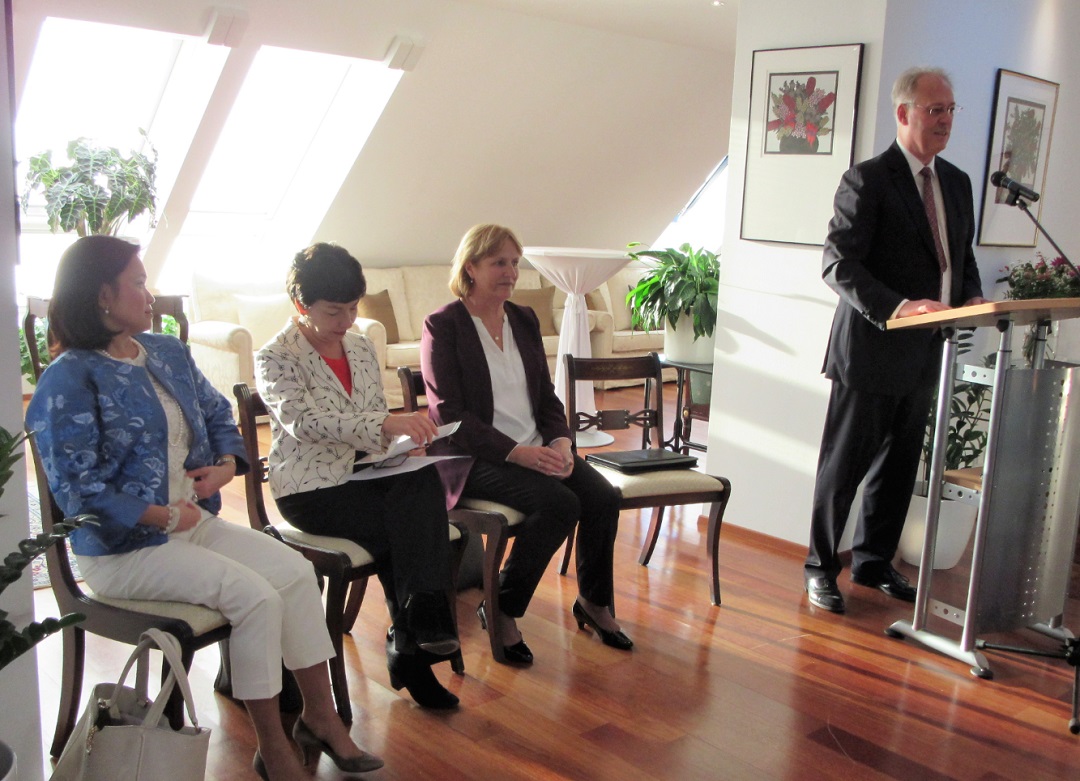
Photo caption (l-r): Miwa Kato, Director, Division for Operations, UNODC; Mary Alice Hayward, Deputy Director General, IAEA; Debra Robertson, Detective Superintendent, Operations Commander for Organised Crime, Victoria Police, Australia; Ambassador Dr Brendon Hammer. Copyright: Australian Embassy.
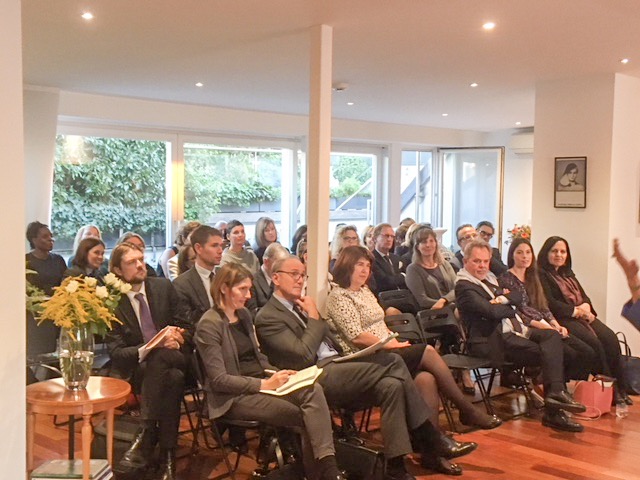
Ambassador Dr Brendon Hammer hosted a panel discussion “Achieving Gender Equality through Organisational Change” on 25 September 2018. Esteemed panellists, Ms Deborah Robertson, Detective Superintendent, Victoria Police; Ms Mary Alice Hayward, Deputy Director General, International Atomic Energy Agency (IAEA); and Ms Miwa Kato, Director, United Nations Office on Drugs and Crime (UNODC) shared perspectives from their respective organisations as well as personal experiences. The event, attended by Heads of Mission and representatives from Vienna based international organisations, including members of gender focal point networks highlighted the importance of:
- ensuring gender diversity and a ‘critical mass’ of women at senior management levels to enhance organisational outcomes and effectiveness;
- setting the tone from the top - active and dedicated leadership in ensuring effective and lasting organisational change which supports gender parity outcomes;
- a consistent approach in calling out and/or sanctioning behaviour or practices in a workplace which hold back gender parity;
- recognising and confronting gender-based biases – including assumptions about what men and women can or can’t do;
- flexible and accommodating workplace practices that allow both men and women to thrive and reach their potential;
- gender targets in ensuring an accountable approach to reaching gender parity objectives.
Australia is co-chair of the Group of Friends for Women in Nuclear at the International Atomic Energy Agency (IAEA) in Vienna and Ambassador Hammer is an International Gender Champion.
Australia's National Statement to the 62nd IAEA General Conference
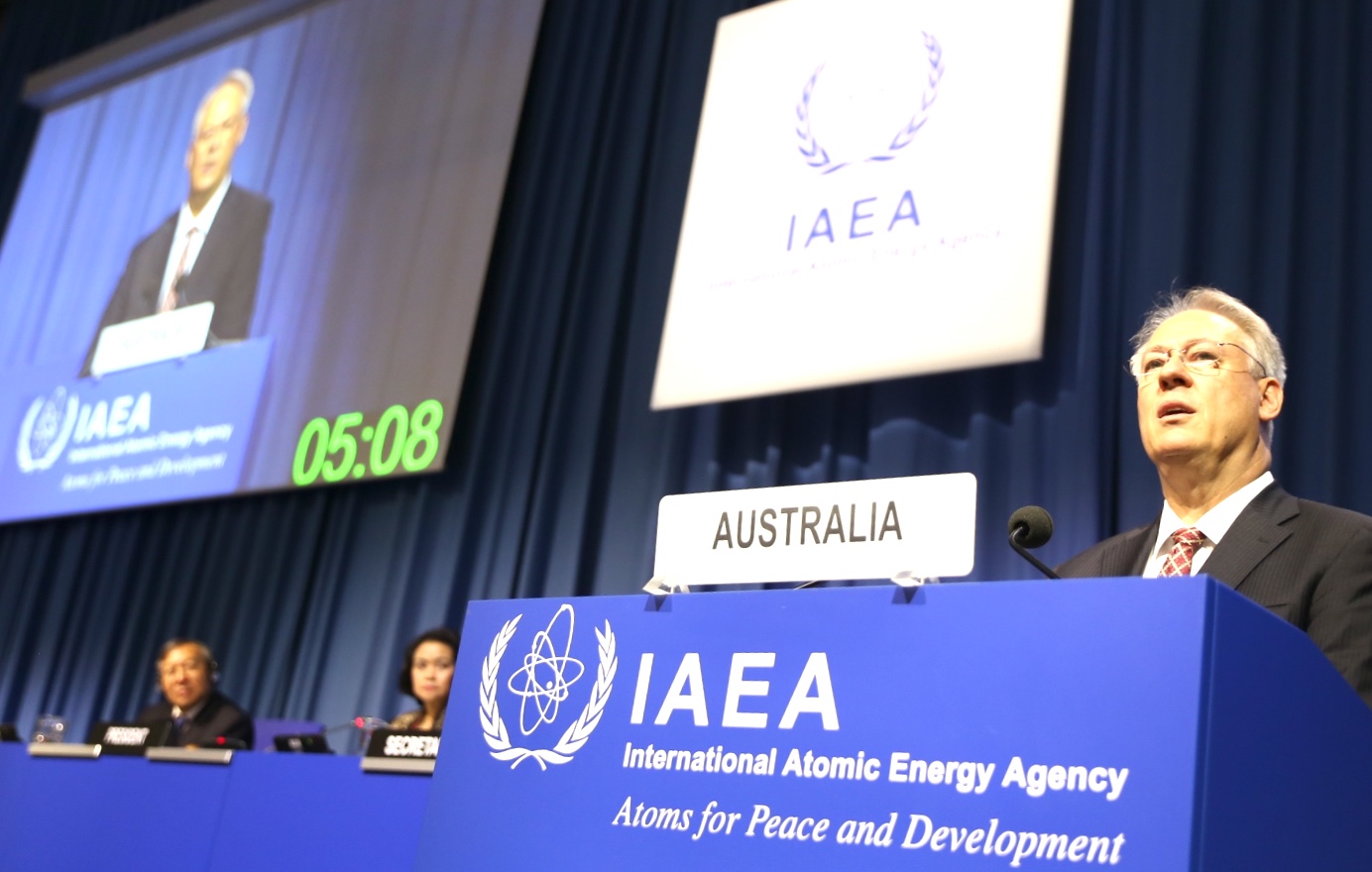
On 19 September 2018, Australia's Head of Delegation, Ambassador Dr Brendon Hammer, Governor and Permanent Representative to the International Atomic Energy Agency (IAEA), delivered Australia's statement to the 62nd Regular Session of the IAEA General Conference. Read the statement here. Copyright: Australian Embassy.
Study in Australia: Call for Applications for 2019 Endeavour Leadership Program
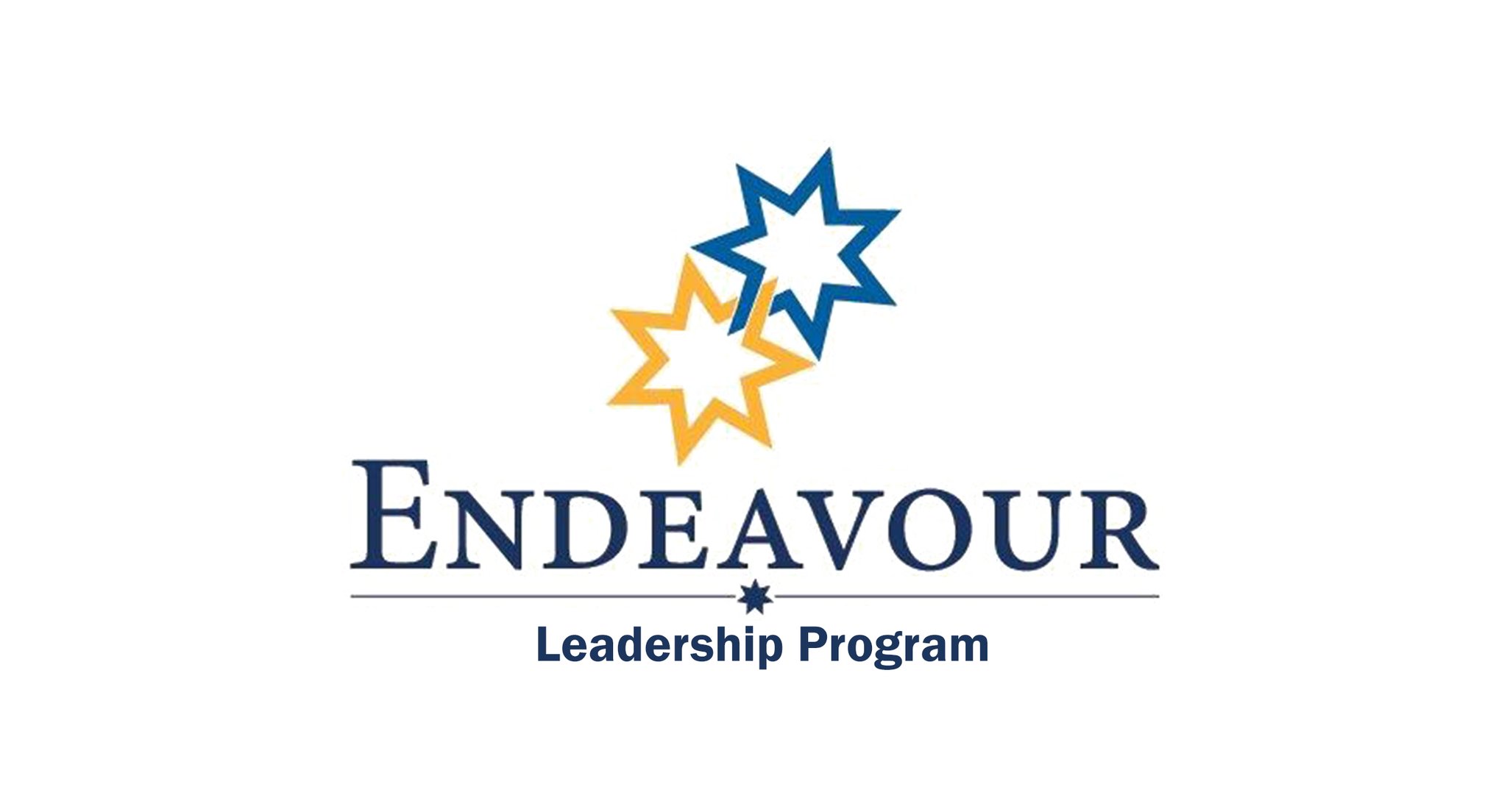
Applications are now open for the 2019 Endeavour Leadership Program (ELP). Through the ELP, Australia will support established and emerging leaders from partner countries study in Australia. Successful applicants from priority countries will receive tuition fees and travel and other allowances paid (capped) in recognition of their contribution to building education, research and innovation links. High-achieving individuals from Austria, Bosnia and Herzegovina, Hungary, Kosovo, Slovakia or Slovenia are encouraged to apply. This is a great opportunity for high-achieving individuals to develop their knowledge and expertise and build institution-to-institution connections with Australia across a broad range of professional fields.
To find out if you are eligible, please visit https://internationaleducation.gov.au/Endeavour%20program/Scholarships-and-Fellowships/Pages/default.aspx
Applications close on Thursday 15 November 2018.
Celebrating Austrian-Australian environmental links
Crescendo Choir joined by Ambassador Dr Brendon Hammer, Salzburg Mayor Mr Harald Preuner, Gerald Weindorfer and Edwin Weindorfer. Copyright: Australian Embassy.
Ambassador Hammer with Edwin Weindorfer, great-great nephew of Gustav Weindorfer. Copyright: Australian Embassy.
Ambassador Hammer with Mayor Preuner. Copyright: Australian Embassy.
On 16 July 2018, Ambassador Dr Brendon Hammer joined the Mayor of Salzburg, Mr Harald Preuner, to celebrate with Tasmania’s Crescendo Choir the major contribution of Austrian botanist Gustav Weindorfer to conservation of wilderness in Tasmania. Gustav Weindorfer emigrated to Australia in 1900 and together with his Tasmanian wife Kate laid the foundations for establishment of the Cradle Mountain – Lake St Clair National Park. With its ancient rainforests, alpine heath and the iconic Cradle Mountain, the national park is part of the UNESCO World Heritage listed Tasmanian Wilderness.
Gustav Weindorfer’s relatives, great-nephew Gerald and great-great-nephew Edwin Weindorfer, were instrumental in organising the visit of the Crescendo Choir to Austria, including their special performance of The Mountain by renowned Australian composer Paul Jarman in the Marble Hall of Mirabell Palace. The moving performance, a tribute to Cradle Mountain and the love between Gustav and Kate Weindorfer, was beautifully complemented by display of historic photos of the couple.
NAIDOC Week 8 July to 15 July

Sunday July 8 marks the beginning of NAIDOC week for 2018. NAIDOC week is a celebration of the history, culture and achievements of Aboriginal and Torres Strait Islander Australians. Communities throughout Australia hold activities and celebrations during NAIDOC week, including community barbeques, historical visits and cultural performances. NAIDOC stands for National Aborigines and Islanders Day Observance Committee.
The theme of this year’s NAIDOC week is “Because of her, we can”, and celebrates the role of Indigenous women and their achievements. Aboriginal and Torres Strait Islander women are and have been leaders, politicians, and advocates for social change at the community, local state and national levels. Despite the longstanding and significant contribution these women have made to Australian society, the role of Indigenous women has sadly been insufficiently recognised. NAIDOC Week 2018 is an opportunity to celebrate Australia’s Indigenous women, their courage, determination and contribution to Australia.
Information on NAIDOC week can be found on the NAIDOC webpage.
Pride 2018 in Vienna, Budapest and Bratislava
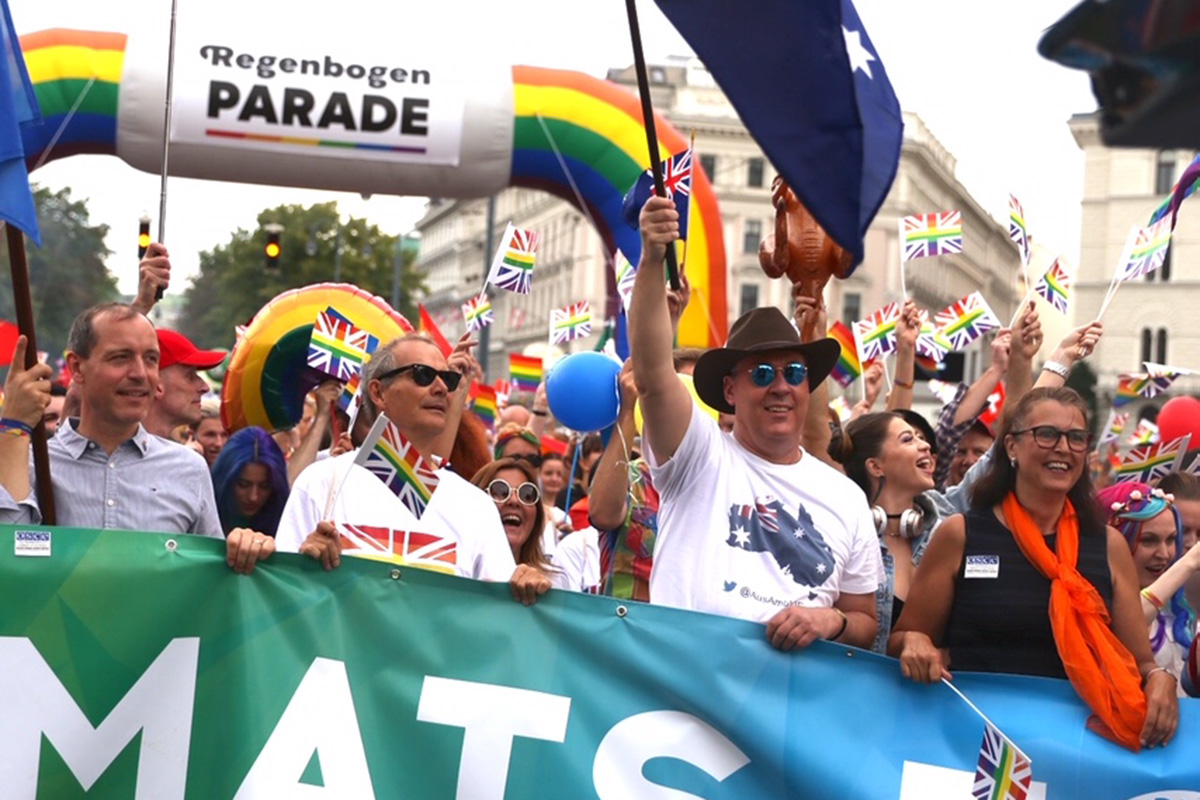
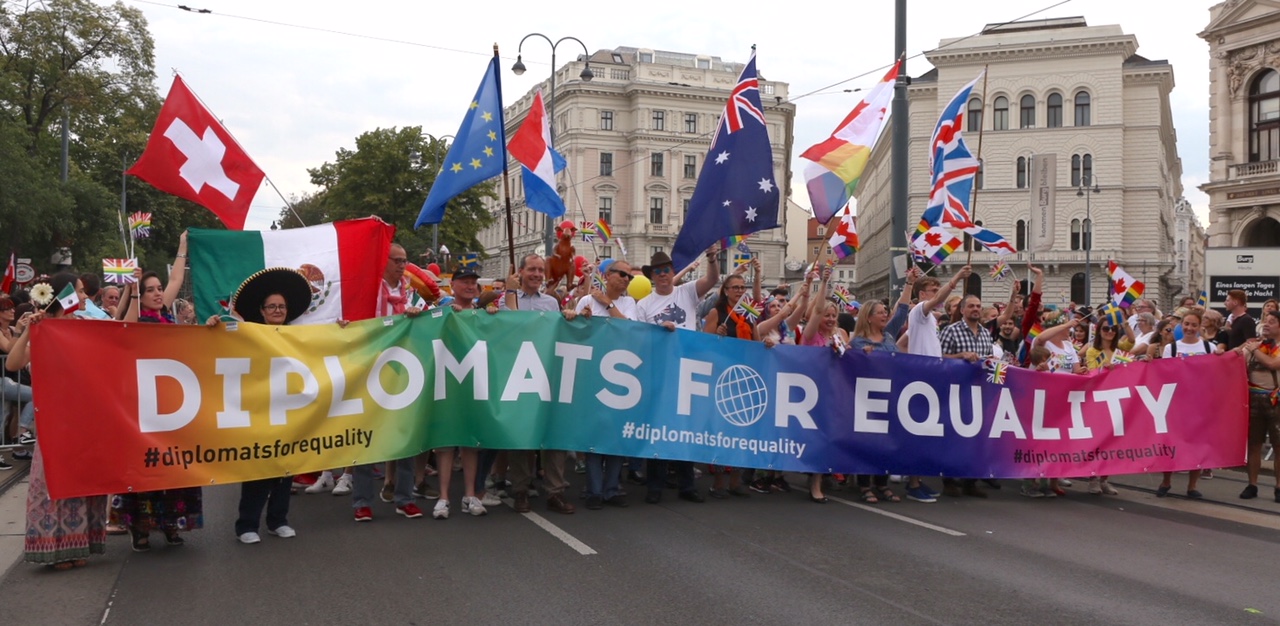
Ambassdor Dr Brendon Hammer and diplomatic colleagues at Vienna Pride 2018. Copyright: Australian Embassy.
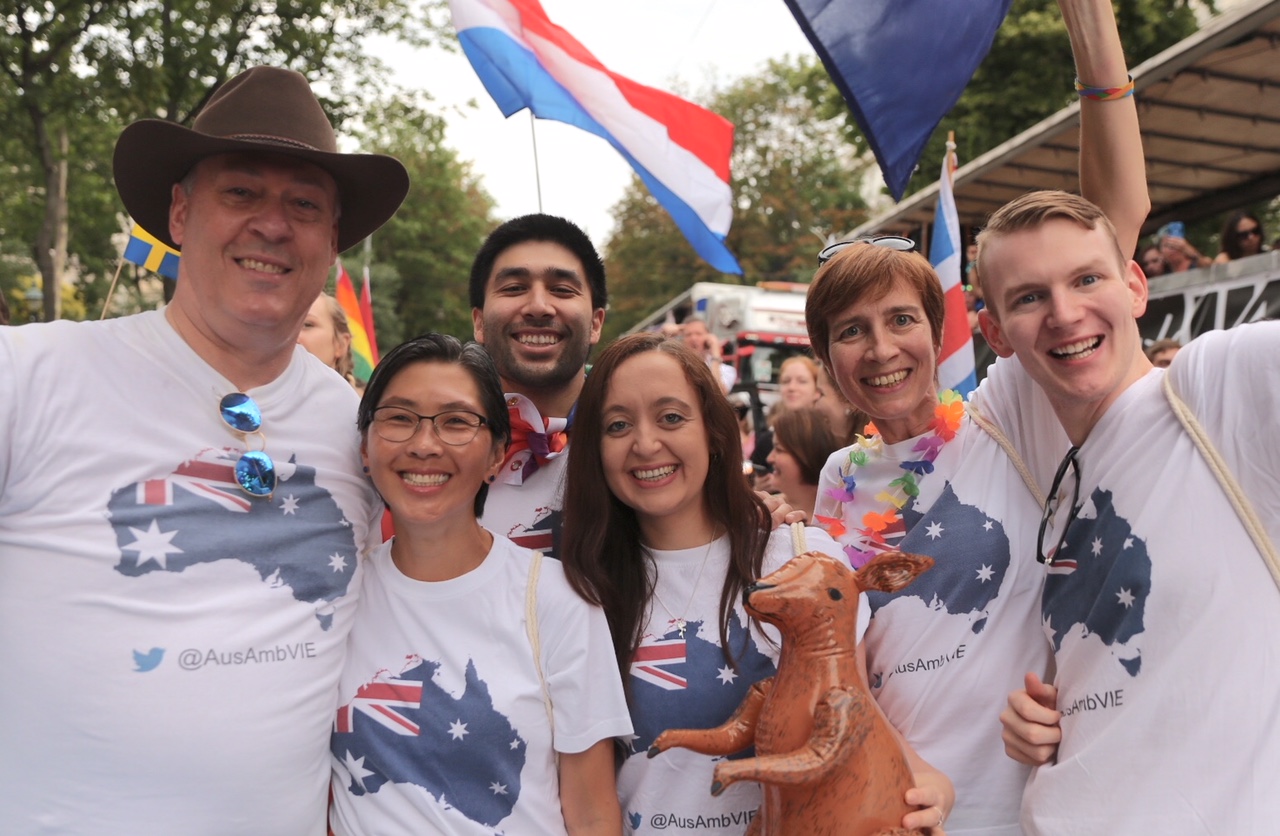
Australia is committed to advocating for respect and non-discrimination against Lesbian, Gay, Bisexual, Transgender, Queer and Intersex (LGBTI) persons, including through our work in international organisations and fora. The Australian Government believes that human rights are universal, indivisible and interdependent and that all people are entitled to respect, dignity and legal protection regardless of their sexual orientation or gender identity.
In Austria, Ambassador Dr Brendon Hammer and Australian Embassy staff joined members of another 34 diplomatic missions to march as Diplomats for Equality at the Vienna Pride festival on 16 June, and to celebrate diversity together with an estimated 200,000 participants. One month earlier, on 17 May, the Australian Embassy together with Diplomats for Equality issued a joint statement on the International Day Against Homophobia and Transphobia IDAHOT. Read more here.
In Hungary, the Australian Embassy joined the statement of 35 Diplomatic Missions in support of the 23rd Budapest Pride Festival taking place from 6 – 7 July 2018. Please read the joint statement issued on 5 July here.
In the Slovak Republic, the Australian Embassy joined the statement of 31 Diplomatic Missions in support of pride marches for LGBTI rights in Bratislava on 14 July and in Košice on 1 September 2018. Please read the joint statement here.
Australia’s Participation at the 27th Session of the Commission on Crime Prevention and Criminal Justice 2018
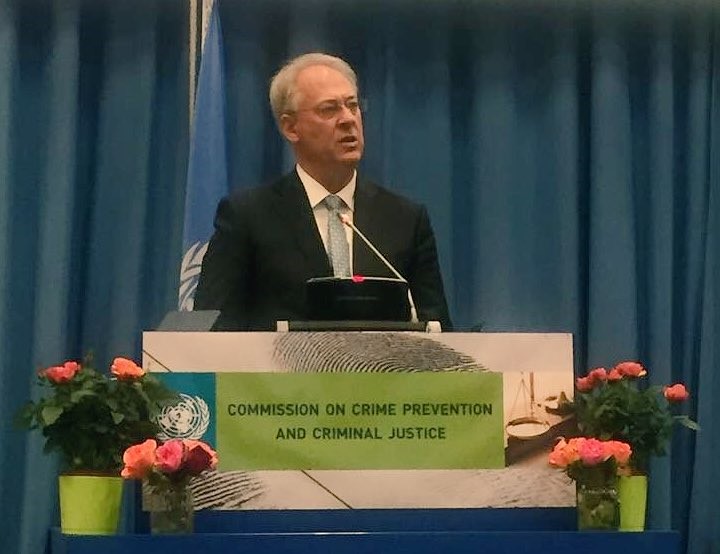
Photo caption: Ambassador HE Dr Brendon Hammer, Permanent Representative to the United Nations in Vienna, delivering Australia’s national statement to the 27th Commission on Crime Prevention and Criminal Justice. Copyright: Australian Embassy.
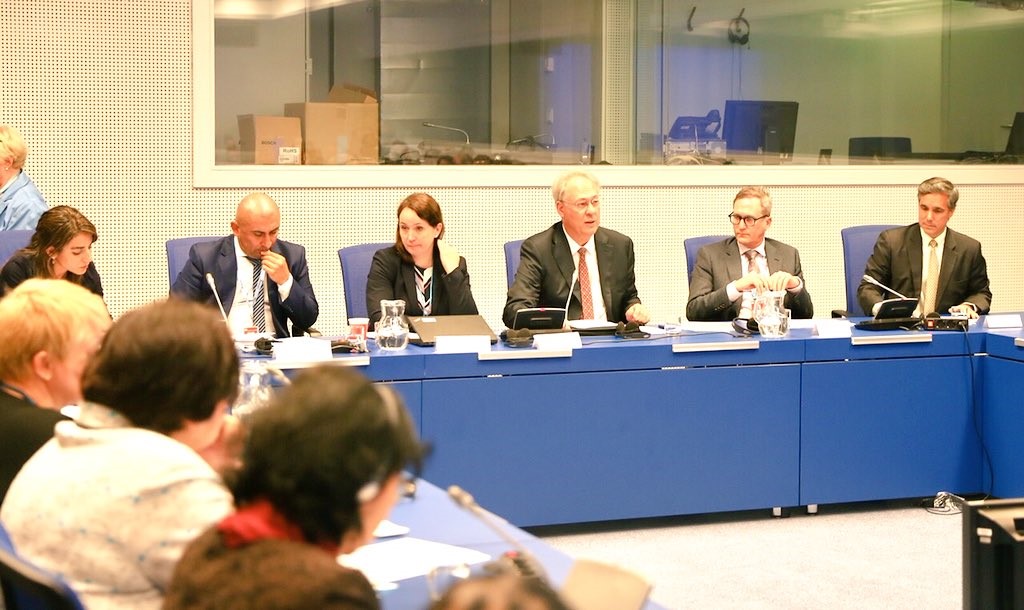
Photo caption: Dr Geoffrey Shaw, Australia’s Ambassador for People Smuggling and Human Trafficking, speaking at a side event, chaired by Ambassador HE Dr Brendon Hammer, on the need for complementary work and international partnerships to address SDG 8.7 on forced labour, modern slavery, human trafficking and child labour. Copyright: Australian Embassy.
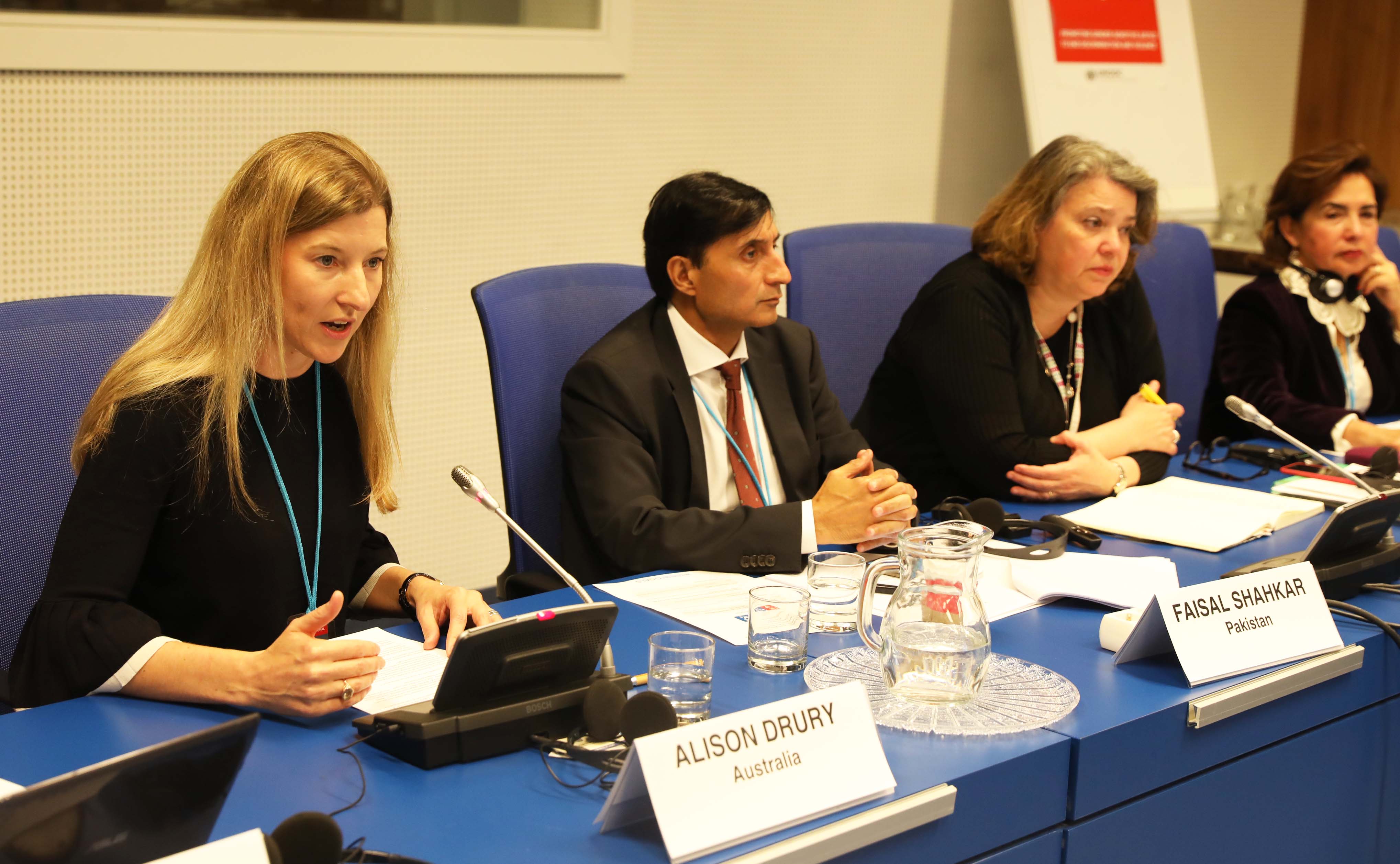
Photo Caption: Australia’s Deputy Head of Mission, Alison Drury, presented at a side-event on the United Nations Joint Global Programme on Essential Services for Women and Girls Subject to Violence. Copyright: Australian Embassy.
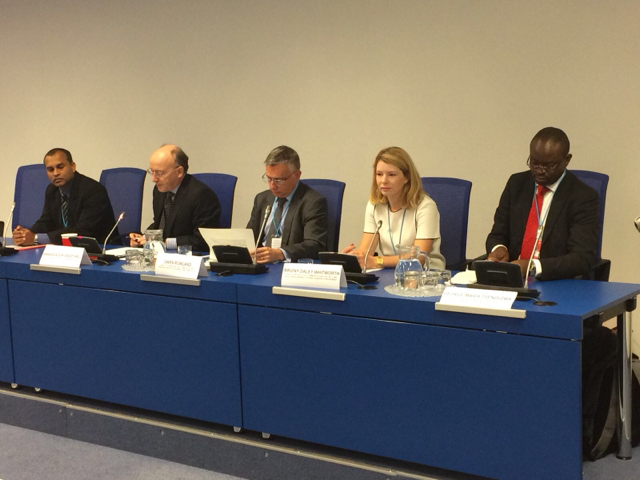
Photo caption: Briony Daley Whitworth, Acting Senior Legal Officer, Attorney-General’s Department discussing Australia’s efforts to combat cybercrime and our commitment to global cooperation, particularly in the Indo-Pacific region. Copyright: Australian Embassy.
Australia participated at the 27th Commission on Crime Prevention and Criminal Justice (CCPCJ), in Vienna from 14-18 May. The CCPCJ is the UN’s principal policy-making body on criminal justice issues and a key forum for advancing our interests in shaping comprehensive and integrated global crime prevention strategies. A copy of Australia’s national statement can be found here.
With its focus on cybercrime, the Commission provided an opportunity for Australia to highlight the work Australia is doing to implement its International Cyber Engagement Strategy, including by investing 30 million dollars to improve cyber resilience in the Indo-Pacific region.
Combatting modern slavery was also a focus for Australia. Australia’s Ambassador for People Smuggling and Human Trafficking, Dr Geoffrey Shaw, spoke on the work of Alliance 8.7, a global initiative chaired by Australia, which aims to strengthen international cooperation to meet Sustainable Development Goal 8.7. Australia also announced $50,000 in funding to assist the work of the UNODC through its Voluntary Trust Fund for Victims of Trafficking in Persons, especially Women and Children.
Throughout the meeting, Australia continued to call for the mainstreaming of gender perspectives into criminal justice systems, in accordance with CCPCJ Resolution 26/3, adopted in 2017.
National Reconciliation Week 27 May to 3 June 2018
Don’t Keep History A Mystery

Sunday May 27 marks the beginning of the 18th anniversary of National Reconciliation Week. The focus of National Reconciliation Week is to encourage all Australians to learn about the shared histories, culture and achievements of Indigenous Australians. National Reconciliation Week also aims to educate and explore how all Australians can contribute to achieving reconciliation. The dates of National Reconciliation Week coincide with two significant events in Australia’s history.
On 27 May 1967 Australians universally accepted the inclusion of Aboriginal and Torres Straight Islanders into the national census count, as well as allowing the federal government to implement laws for Indigenous Australians. On the 3 June 1992, the High Court of Australia overturned the principle of Terra Nullius and recognised Aboriginal and Torres Straight Islanders as the traditional owners of Australian land. This case is commonly referred to as “The Mabo Decision” after key campaigner Eddie ‘Koiki’ Mabo. The outcome of the Mabo Decision led to the introduction of the Native Title Act in 1993. Today more than two million square kilometres of Australian land have been recognised as belonging to Aboriginal and Torres Strait Islander Australians.
The theme of this year’s National Reconciliation Week is Don’t Keep History a Mystery: Learn, Share, Grow. In 2018, Reconciliation Australia aims to invite everyone to learn more about Aboriginal and Torres Strait Islander cultures and history.
For further information, see National Reconciliation Week video and explore the NRW website.
International Day Against Homophobia and Transphobia (IDAHOT) 2018
The International Day Against Homophobia and Transphobia (IDAHOT) is celebrated annually on 17 May. IDAHOT embraces the diversity of lesbian, gay, bisexual, transgender and intersex (LGBTI) people and promotes acceptance and respect regardless of sexual orientation or gender identity. Australia is a strong advocate for equal human rights, non-discrimination and non-violence for LGBTI persons globally. The Australian Embassy and Permanent Mission in Vienna has issued, together with 30 foreign missions in Vienna, an IDAHOT statement in support of LGBTI people. Read the statement here.
Celebrating the Entry into Force of the Australia-Austria Work and Holiday Visa Arrangement

Photo caption (l-r): Edward Ho, General Manager, Eva Air; Wolfgang Lukas Strohmayer, Director, Austrians Abroad, Federal Ministry for Europe, Integration and Foreign Affairs; Ambassador HE Dr Brendon Hammer; Maria Bergmann, WHV holder and winner of flight ticket voucher. Copyright: Australian Embassy.
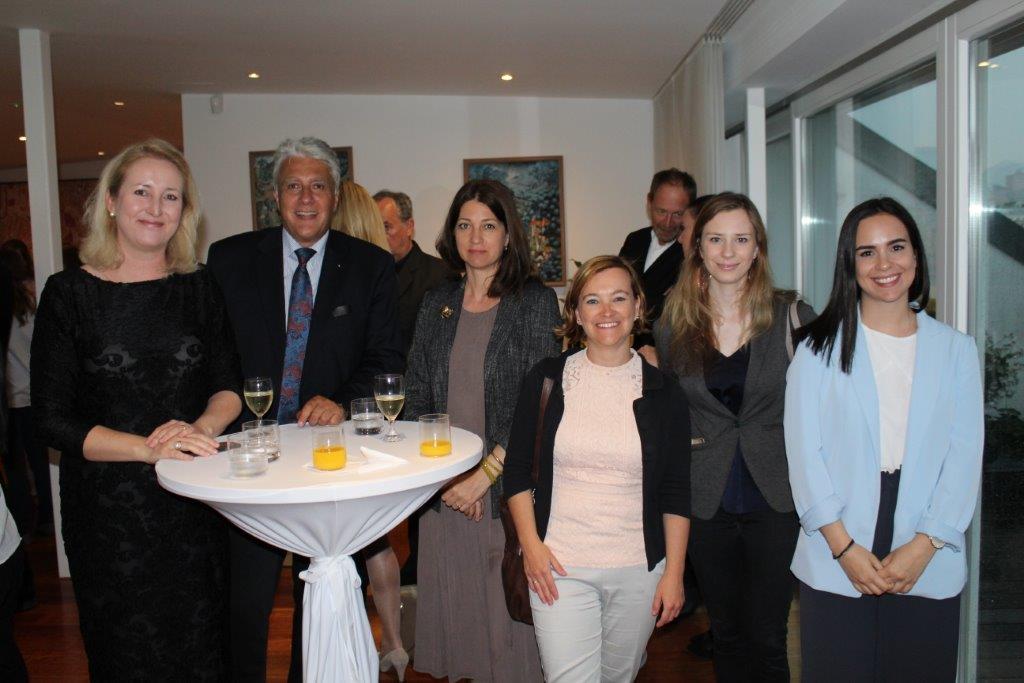
Photo caption (l-r): Jodie Bjerregaard, Australian Embassy Berlin; Wolfgang Lukas Strohmayer, Federal Ministry for Europe, Integration and Foreign Affairs; Barbara Bohaczek, Federal Ministry for Labour, Social Affairs, Health and Consumer Protection; Silvia Perfler, Federal Ministry for Labour, Social Affairs, Health and Consumer Protection; Laura Koestler, alumni; Sandra Oreski, Federal Ministry for Europe, Integration and Foreign Affairs. Copyright: Australian Embassy.
On 8 May, Ambassador Dr Brendon Hammer hosted a reception to mark the commencement of the Australia-Austria Work and Holiday Visa arrangement. The arrangement, which entered into force on 15 February, enables young Austrians and Australians to work and holiday in the partner country for up to twelve months, thereby offering a unique cultural, social, linguistic and intellectual experience for young adults. Australian and Austrian government officials joined a group of Work and Holiday visa holders, alumni and travel industry members in celebrating the launch of the arrangement, which is expected to contribute further to deepening the already excellent people-to-people links that exist between Australia and Austria. One visa holder was the lucky recipient of a flight ticket voucher to Australia and a Work and Holiday Starter package.
Information for Austrians on how to lodge and prepare an application is available on https://www.homeaffairs.gov.au/trav/visa-1/462-- and for Australians on http://www.vfsglobal.com/austria/australia/.
A press release in German is available here.
Anzac Day 2018
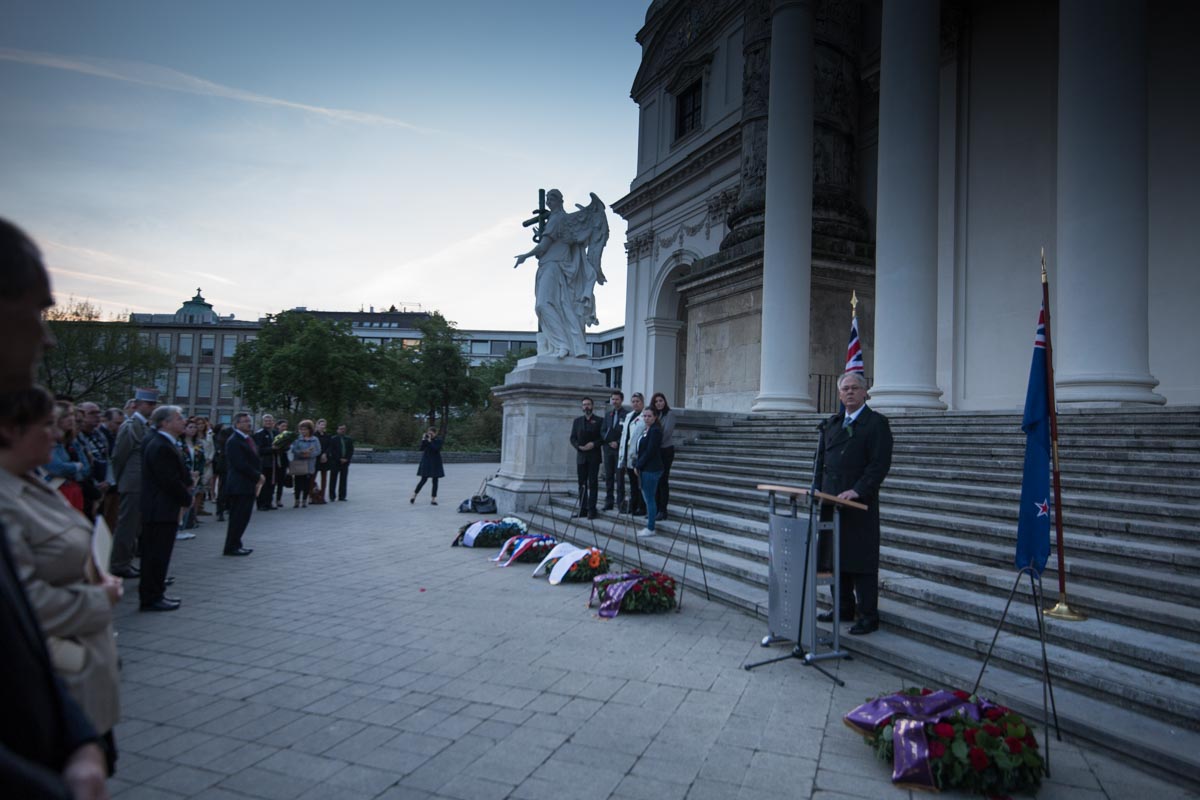
Photo caption: Ambassador HE Dr Brendon Hammer addressing the audience at the 2018 Anzac day commemorative service. Copyright: Australian Embassy.
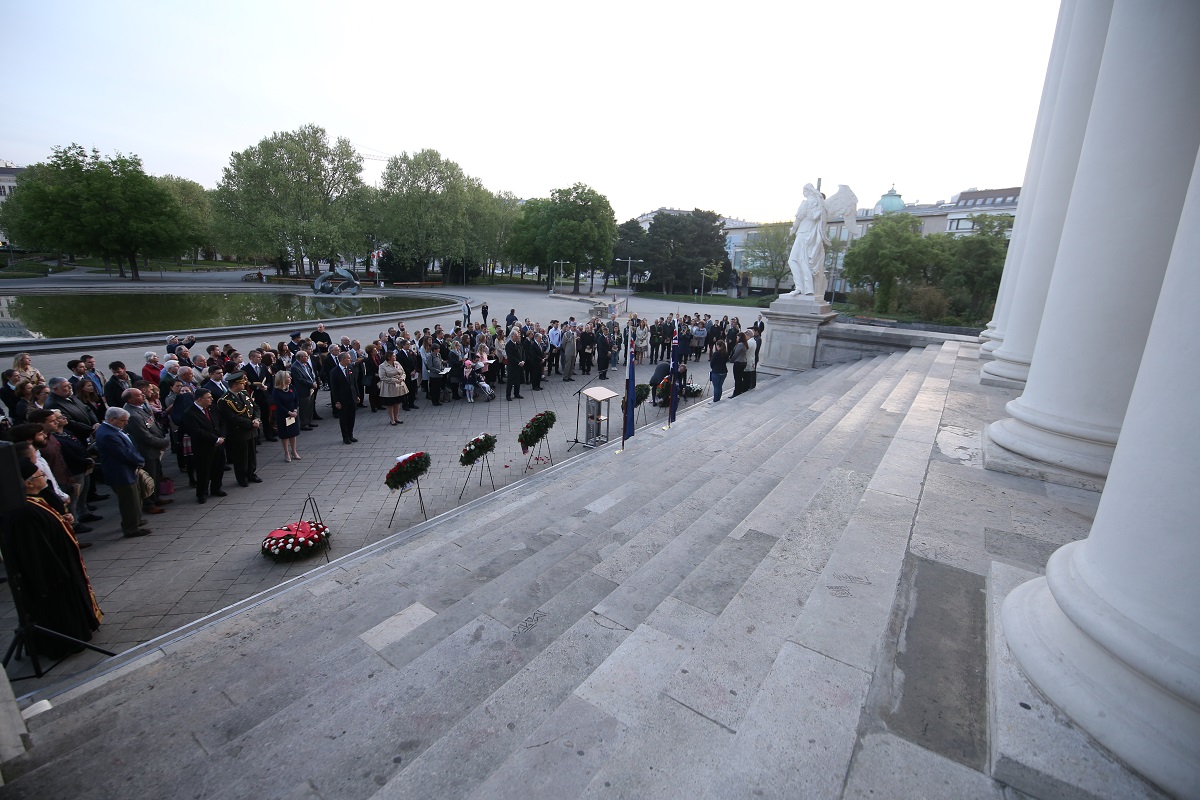
Photo caption: Laying of wreaths at the 2018 Anzac day commemorative service. Copyright: Australian Embassy.
On 25 April, the Australian and New Zealand Embassies commemorated Anzac Day with a Dawn Service held on the steps of the historic Karlskirche church in the centre of Vienna. Vienna-based ambassadors from Britian, Ireland, Canada, France and Turkey, and diplomatic and military representatives from these and several other countries, laid wreaths and stood side-by-side with Australians and New Zealanders, and members of the public, including a Hungarian community group, to mark the occasion.
Australia-Europe Relations Seen through the Eurovision Song Contest
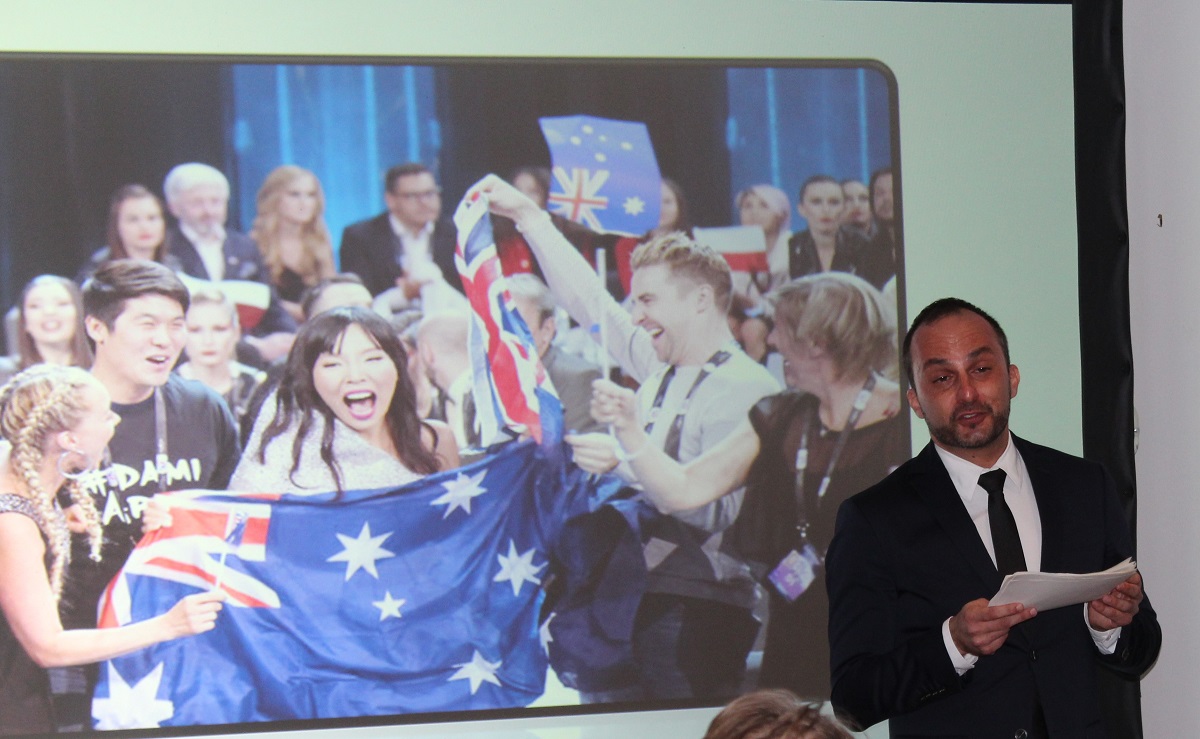
Photo caption: Dr Dean Vuletic citing Australian Korea-born Eurovision 2016 entrant Dami Im as an example of Australia embracing its multicultural society. Copyright: Australian Embassy.
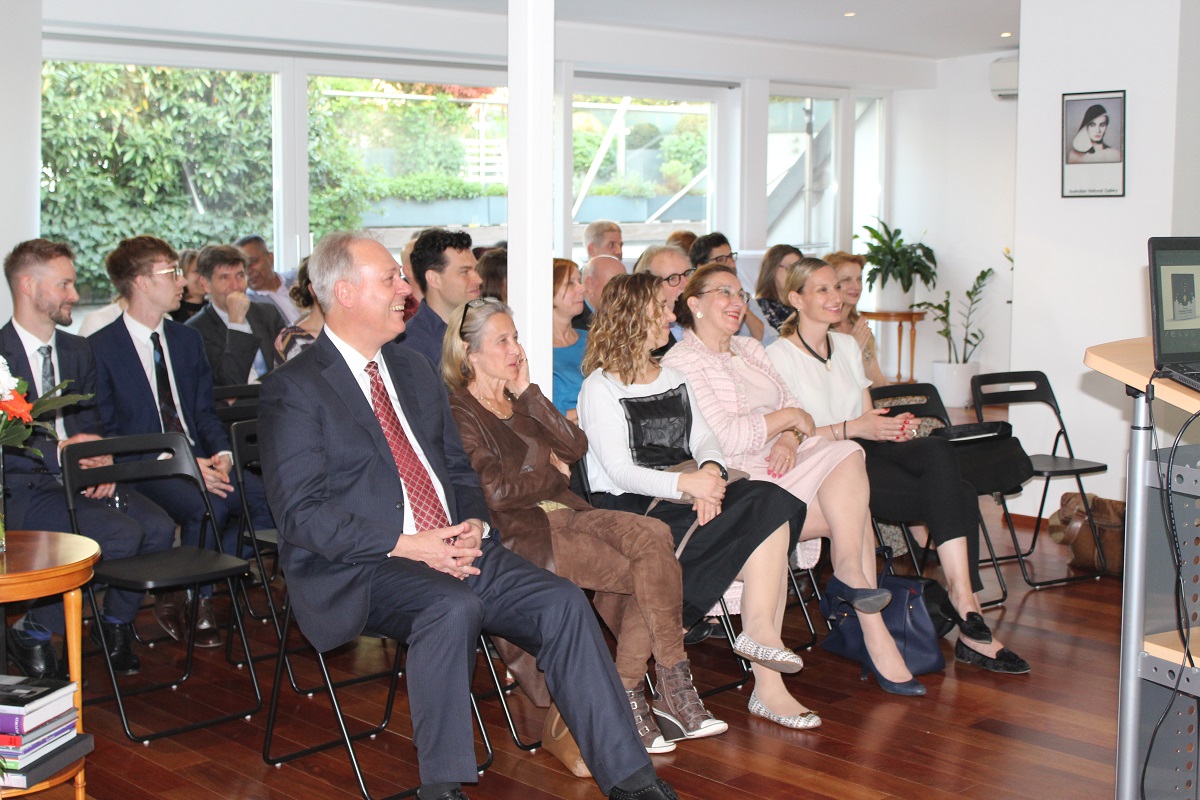
Photo caption: Ambassador HE Dr Brendon Hammer, Austrian ORF Program Director Kathrin Zechner, Croatian Ambassador HE Vesna Cvjetkovic with members of the diplomatic and academic communities listening to Dr Vuletic. Copyright: Australian Embassy.
Ahead of Australia competing for the fourth time in the Eurovision Song Contest in Lisbon from 8-12 May, Australian historian and author Dr Dean Vuletic gave a fascinating presentation about the history of Australian-European relations seen through the prism of the Eurovision Song Contest at the Australian Residence on 24 April. Dr Vuletic shared his perspectives on how Australia’s fascination with the Eurovision reflects our multicultural heritage and society. Australian Eurovision entrants to date have been of either Indigenous or Asian heritage, including this year’s candidate Jessica Mauboy. For more information, please refer to: https://eurovisionworld.com/eurovision/2018/australia.
Sydney Dance Company performance in Slovenia
Image caption: The first ever performance by the Sydney Dance Company in Slovenia on 7 April was a great success, and a hit with Ljubljana’s audience. The show featured productions by Artistic Director Rafael Bonachela (“Lux Tenebris”), Cheng Tsung-lung (“Full Moon”), and Gabrielle Nankivell (“Wildebeest”). Copyright: Australian Embassy.
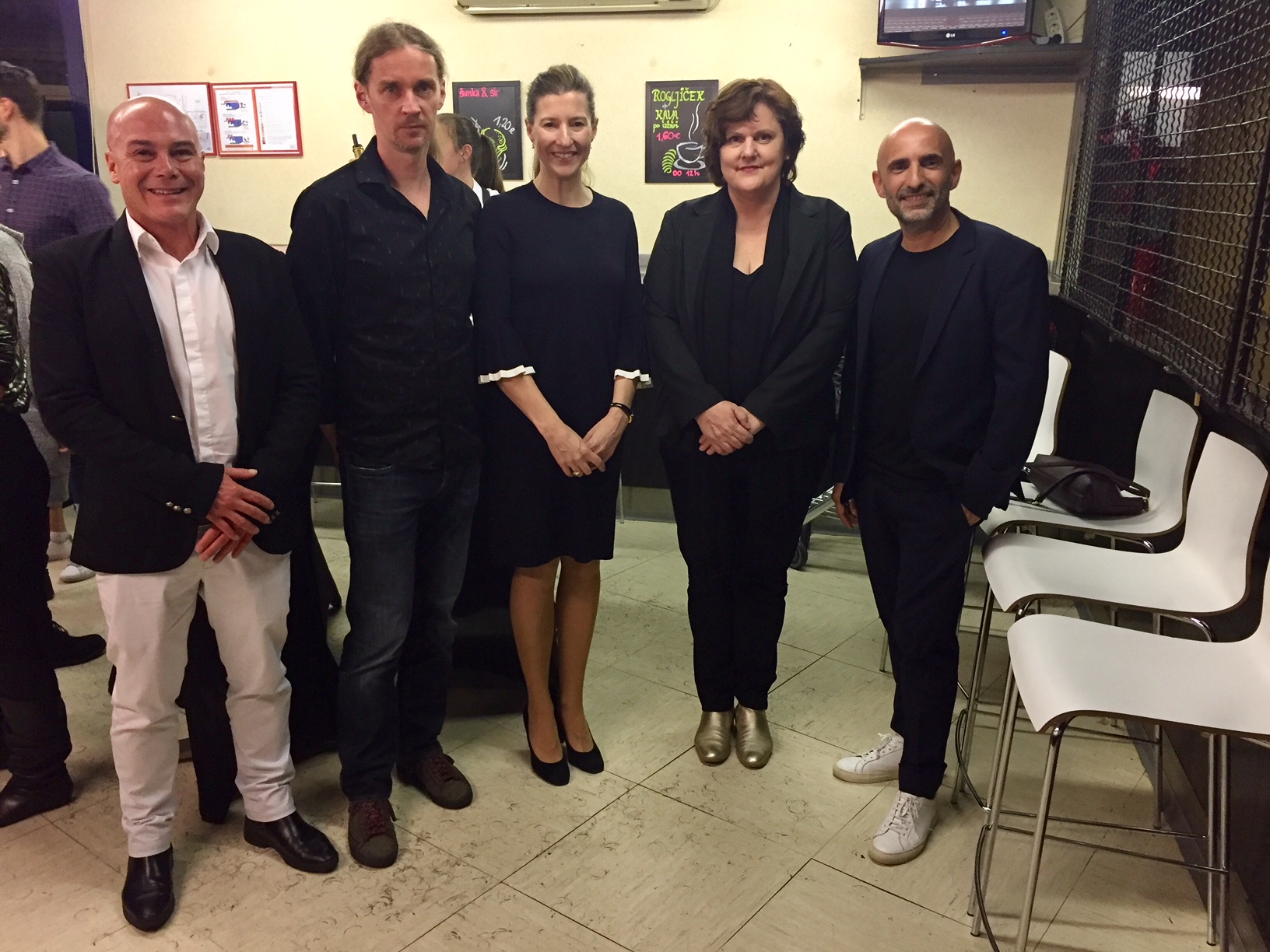
Image caption (l-r): Dominic Chang, Producer, Sydney Dance Company; Andrej Jaklič, Head of Theater and Contemporary Dance, Cankarjev dom; Ms Alison Drury, Chargé d’Affaires, Australian Embassy; Ms Uršula Cetinski, Director General, Cankarjev dom; Rafael Bonachela, Artistic Director, Sydney Dance Company. Copyright: Australian Embassy.
On 7 April, Chargé d’Affaires Ms Alison Drury, in cooperation with Ms Uršula Cetinski, Director General of Cankarjev dom, hosted a reception for Embassy contacts on the occasion of a performance by the Sydney Dance Company in Slovenia’s capital Ljubljana. The show was part of the company’s European Spring Tour and featured Artistic Director Rafael Bonachela’s production “Lux Tenebris”, Cheng Tsung-lung’s “Full Moon” and Gabrielle Nankivell’s “Wildebeest”. The performance was the company’s first show ever in Slovenia, and a great success with Ljubljana’s audience.
Visit by the Hon Julie Bishop MP, Minister for Foreign Affairs, to Hungary and Slovenia
Image caption: On 22 February, Ms Bishop met with Hungarian Prime Minister Viktor Orbán to discuss bilateral ties. Copyright: Australian Embassy.
.jpg)
Image caption: On 23 February, Ms Bishop met with Slovenian President Borut Pahor. Ms Bishop’s visit was the first visit by an Australian Foreign Minister to Slovenia. Copyright: Australian Embassy.
The Hon Julie Bishop MP, Minister for Foreign Affairs visited Hungary and Slovenia from 21 to 23 February 2018 to strengthen bilateral relations and promote Australia’s economic and security interests. The mutual benefits to accrue from a future free trade agreement with between Australia and the EU was a key focus of discussions.
In Hungary, Ms Bishop met with Prime Minister Viktor Orbán; Mr Péter Szijjártó, Minister for Foreign Affairs and Trade, and Visegrád Four Group Foreign Ministers (the Czech Republic, Hungary, Poland and Slovakia). Ms Bishop delivered a presentation entitled The Australian Foreign Policy White Paper: Preserving the Rules-Based Order at the Hungarian Institute for Foreign Affairs and Trade.
Trade and investment opportunities between Australia and Hungary were the focus of a round table discussion at the Hungarian Chamber of Commerce and Industry. Ms Bishop also highlighted the importance of gender equality at a business breakfast on “Women in Leadership”, hosted in cooperation with the Hungarian Business Leaders Forum.
Minister Bishop’s visit to Slovenia was the first ever visit by an Australian Foreign Minister since diplomatic relations were established in 1992. Ms Bishop met with Mr Borut Pahor, President of the Republic of Slovenia; Mr Karl Erjavec, Minister of Foreign Affairs; Mr Dejan Židan, Minister of Agriculture, Forestry and Food and Mr Zdravko Počivalšek, Minister of Economic Development and Technology. The meetings provided an opportunity to discuss shared priorities for Australia and Slovenia’s UN Human Rights Council membership, as well as Slovenia’s UN World Bee Day initiative, which Australia has actively supported. In recognition of the strong people-to-people links shared between Australia and Slovenia, Ms Bishop met with Australian business representatives, alumni, and community members.
For more images, please refer here.
Australia-Austria: Launch of Work and Holiday Visa Arrangement
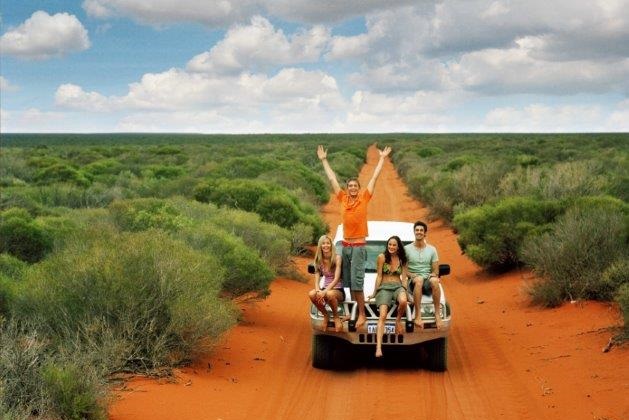

Copyright both photos: Tourism Australia
On 15 February, a reciprocal Work and Holiday Visa arrangement between Australia and Austria will enter into force. Under the program, young Austrians will have the opportunity to work and holiday in Australia for up to a year, and young Australians to do the same in Austria. 200 visas for each side will be available on an annual basis. Applications for the first round open on 15 February.
Information for Austrian citizens on how to lodge and prepare an application is available at https://www.homeaffairs.gov.au/trav/visa-1/462-- Further information and announcements about the program are available at http://germany.embassy.gov.au/beln/Visas_and_Migration.html. Austrian citizens can request a letter of Austrian government support by email to: [email protected].
Australian citizens may apply for a Work and Holiday Visa at the Austrian Embassy in Canberra, the VFS (http://www.vfsglobal.com/austria/australia/) as well as – during a lawful stay in the Schengen area – at the Austrian Embassies in Ljubljana, Bratislava, London and the Austrian Consulate General in Munich. Australian citizens can request a letter of Australian government support by email to: [email protected].
General information for Australian citizens about Work and Holiday arrangements overseas are available at: https://www.homeaffairs.gov.au/trav/ente/work.
Australia Day 2018
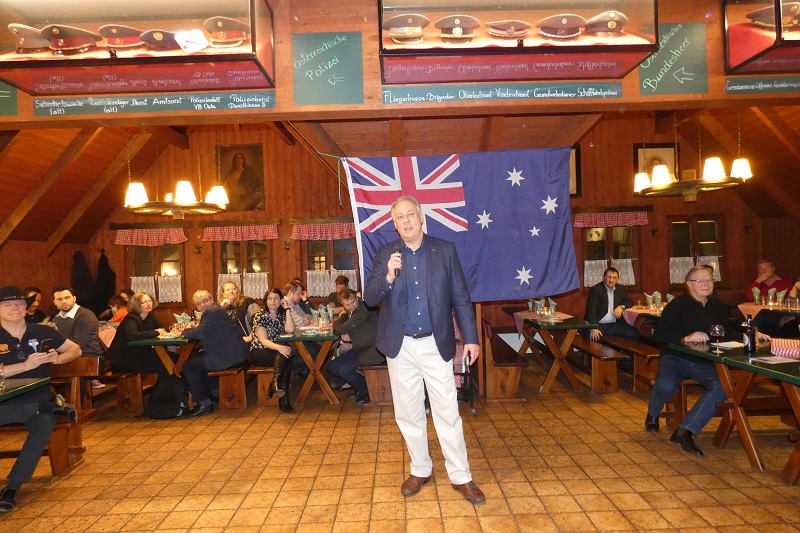
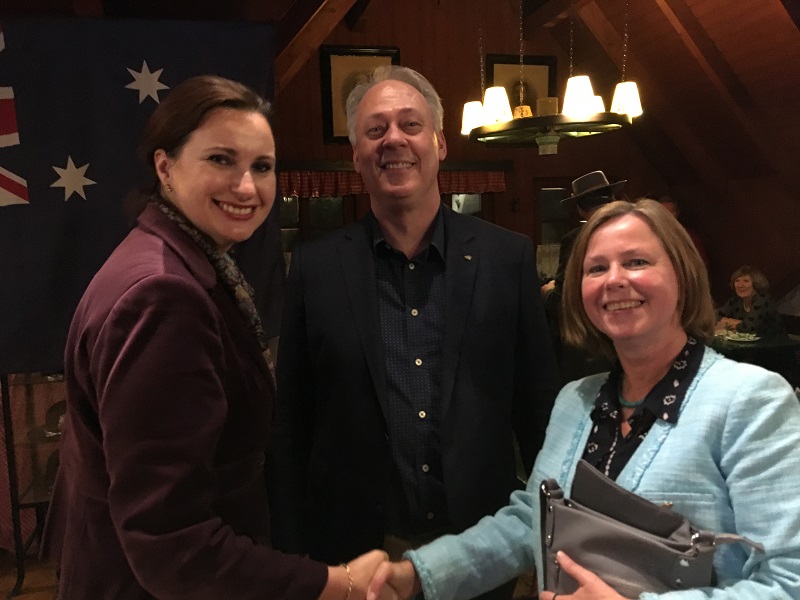
First image above: Ambassador Dr Brendon Hammer addressed members of the Australian Connection in Austria (OzCon) and the Austrian-Australian Society at the Australia Day celebrations in Vienna on 26 January. Copyright: OzCON. Second image above: Ambassador Dr Hammer with Semra Turkovic-Hrle, Assistant Secretary, Secretariat of the Policy-Making Organs, International Atomic Energy Agency (IAEA), and Dr Gabriele Weichart, Secretary General, Austrian-Australian Society. Copyright: Australian Embassy.
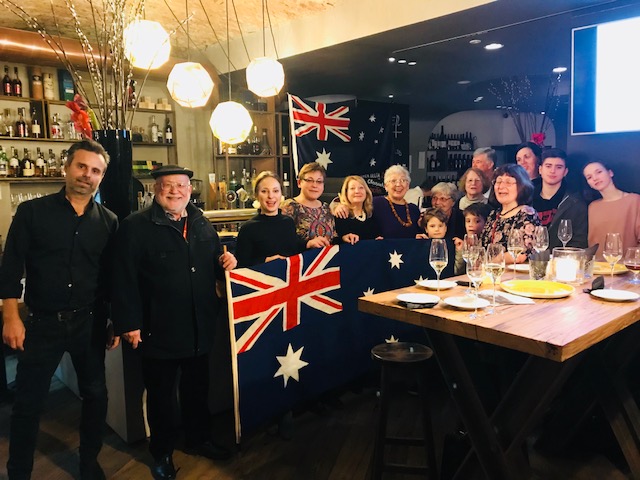
Image: On 26 January, Australians and alumni celebrated Australia Day at the Vander Urbani Resort in Ljubljana, Slovenia. Copyright: Vander Urbani Resort.
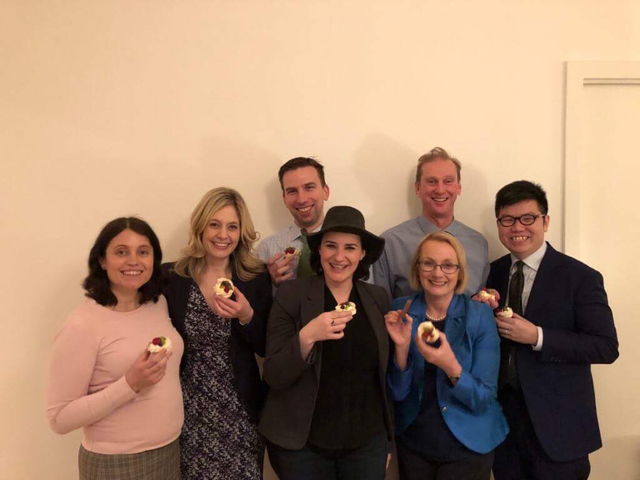
Image: On 25 January, Embassy colleagues held an informal Australia Day celebration with Australians from International Organisations and nuclear policy contacts in Vienna. Copyright: Australian Embassy.
On 26 January 2018, Australians and alumni in Austria, Hungary, Kosovo, and Slovenia got together to celebrate Australia Day with family and friends. In Austria, Ambassador Dr Brendon Hammer joined the Australian Connection in Austria (OzCon), and the Austrian-Australian Society, for an Australia Day celebration at a typical Heuriger in Vienna’s 19th district. Special guests included members of the Graz regulars alumni table. The program included music performed by Australian Vienna-based vocalist Sonia Anfiloff, a quiz and a slide-show of Australian images. On 25 January, Australian Embassy colleagues hosted an informal Australia Day celebration for Australians from International Organisations and nuclear contacts based in Vienna.
In Hungary, the Nozzies celebrated Australia Day in Budapest at Beckett's Irish Pub. In Kosovo, the Council of Kosovo-Australia Relations hosted an Australian National Day reception for more than fifty people in Pristina. In Slovenia, Australians and alumni got together for an Australia Day event at the Vander Urbani resort in Ljubljana. For more information about Australia Day, please visit: www.australiaday.org.au
Achieving Gender Equality and Female Empowerment: Australia participates in ACUNS Vienna UN conference 2018
.jpg)
On 10 January, Ambassador HE Dr Brendon Hammer spoke about Australia’s commitment to gender equality, female empowerment and ending violence against women at the Vienna UN Conference 2018 organised by the Academic Council on the United Nations System (ACUNS). Read Ambassador’s speech here.
.jpg)
Photo caption (l-r): International Gender Champions Vienna: HE Ambassador Helen Eduards, Sweden; HE Ambassador Christine Stix-Hackl, Austria; Fatou Haidara, Managing Director, Policy and Programme Support, UNIDO; HE Ambassador Jean-Louis Falconi, France; Nicole Shampaine, Chargé d’Affaires a.i., USA; Lassina Zerbo, Executive Secretary, CTBTO; Simonetta Di Pippo, Director, UNOOSA; Jean-Luc Lemahieu, Director, DPA Division of Policy analysis and Public Affairs, UNODC (at the back); HE Ambassador Dr Brendon Hammer, Australia; Laura Rockwood, Executive Director, Vienna Center for Disarmament and Non-Proliferation; HE Ambassador Claude Wild, Switzerland; HE Ambassador Andrej Benedejcic, Slovenia; Martin Kreutner, Dean and Executive Secretary, International Anti-Corruption Academy (IACA); HE Ambassador Hannu Kyröläinen, Finland. Copyright (both photos): Australian Embassy.
Achieving gender equality and the empowerment of women are key pillars of Australia’s domestic policy and also span Australia’s foreign policy, economic diplomacy and aid efforts. Australia has adopted policies to ensure that at least 80 per cent of Australia’s aid investments address gender issues. For example, Australia’s Pacific Women Shaping Pacific Development aid program is specifically targeted at supporting women in 14 Pacific countries.
Australia recognises the great economic potential that the empowerment of women can bring and works to support their participation in the workforce. Unlocking this potential and advancing gender equality could lead to substantial global growth.
Australia is also committed to ending violence against women and has set up an ambitious reform agenda seeking to meet that objective, including through cultural change.
